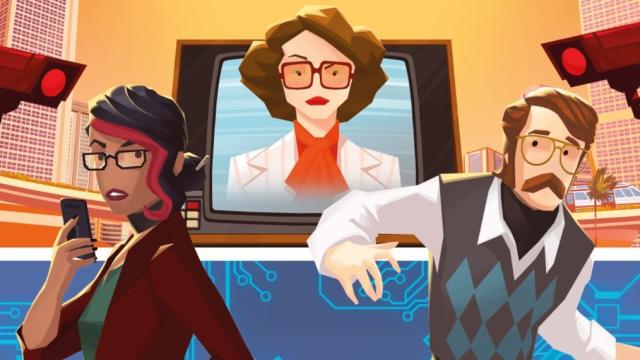It’s not the sort of thing you often see in games these days.
For the first ten minutes of American Arcadia, I’m strolling and jumping my way toward the right side of the screen — y’know, typical side-scrolling platforming. Then, suddenly, I’m a different character, viewing the world from first-person. Huh.
American Arcadia is the next game from Out of the Blue, a Madrid-based studio that broke onto the scene in 2020 with the Lovecraftian puzzle game Call of the Sea. Following that debut, Out of the Blue stayed relatively quiet until releasing a 30-second teaser for American Arcadia in April. Earlier this month, at the Tribeca Festival, I had a chance to play a preview build. (Programming note: The demo crashed about 20 minutes in. This was the result, at least to my understanding, of a hardware issue. I’m told I was pretty close to the end anyway.)
American Arcadia, which does not have a release date but is in development for PC and consoles, is not a puzzle-platformer. Rather, it’s a puzzler and a platformer. Set in a ‘70s-inspired retro future, it opens in media res, with an office worker named Trevor sitting in an interrogation chamber recounting how he escaped. During these segments, told via flashback, you navigate your way through a massive office building.
But a few minutes in, a twist. You learn that Trevor isn’t working at some nondescript corporation. He’s an unwitting cast member on a reality TV show. (The Truman Show is an obvious comparison.) His best friend, Gus, has been, shall we say, removed from the cast, under the guise of “winning a vacation.” Trevor, reading between the lines, tries to escape. The perspective then shifts, and you assume the role of Angela, a producer on the show.
It’s a lot to take in. Here’s a rundown:
“We wanted something different, and we came up with this cool idea of escaping a TV show, we thought it [could have] one character living inside the screen,” Tatiana Delgado, American Arcadia’s creative director, told Kotaku. “It made sense to differentiate them…We wanted to separate them with [a] metaphor.”
Of course, there are plenty of games that grapple with shifting perspectives. Dating back to the days of Zelda II, Golgo 13: Top Secret Episode, and The Legend of the Mystical Ninja, developers have experimented with designing games around such a gimmick. For a bit, it’d be, say, a side-scrolling platformer. Then you’d shift to a top-down view.
This is far less common in modern games. (Yes, some tentpoles like Grand Theft Auto V and various Elder Scrolls entries let you play the game in both first- and third-person viewpoints, but that’s just a feature, not essential to the core gameplay.) Ubisoft did it in 2013 with the pirate history sim Assassin’s Creed IV: Black Flag. The bulk of Black Flag is set in the past, an action game viewed in third-person. But that’s punctuated by a handful of exploration segments in a 2010s office building, all of which are played first-person. I’m sure you’ll point out a few games I’m missing in the comments, too.
For one thing, some game engines — the toolkit developers used to make video games — are better. (We saw this with BioWare’s Mass Effect: Andromeda, which suffered a tumultuous production in part because EA decreed that it be developed on DICE’s proprietary Frostbite engine. Frostbite was a really good basis for first-person games, less so for sprawling third-person RPGs.) But designing games for two perspectives also requires a flexible mindset and poses a different set of challenges.
“For a first person game, you can just create a room and fill it with things and you can explore,” said Delgado. “In a 2.5D game, you create a lot of things for a room that you can pass in 30 seconds. The biggest challenge is to create a production for a larger level that is going to be played in a shorter time.”
American Arcadia has its cake and eats it too. From what I played, thanks to the shifted perspectives, you’re forced to slow down a bit in densely packed environments. As Trevor, I found myself trying to navigate an unlit room. The game then moved me to Angela. In a TV studio, I had to block out some cameras and break into a colleague’s office, where once I turned on the light, the game shifted me back to Trevor, at which point I could actually see what I was doing and where I needed to go. It’s one room that I got to engage with twice.
It wasn’t exactly the toughest problem to solve, but Delgado said that, while American Arcadia is on the whole a bit less of a head-scratcher than Call of the Sea, puzzles get more complex later in the game. That, of course, is something that can only be judged when the game comes out. (American Arcadia doesn’t have a release date.) But at the very least, it’ll feature something you don’t often see these days.

Leave a Reply